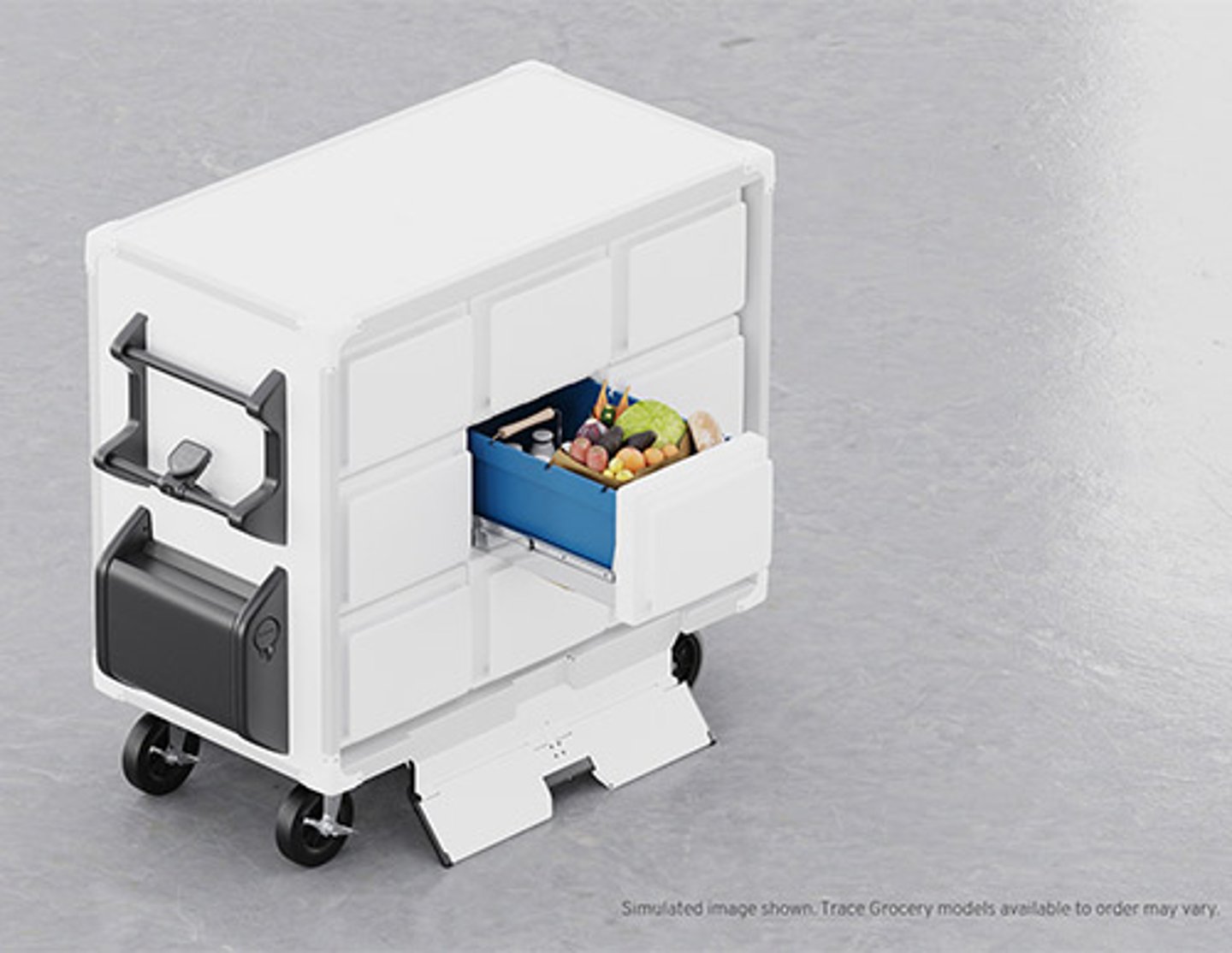Kroger rolling out automated cart for curbside pickup of online orders
The Kroger Co. is introducing a new option for customers to pick up online orders at local stores.
America’s largest grocer is slated to be the first retailer to introduce the BrightDrop Trace Grocery solution into its e-commerce operations, beginning in 2022. Built on the BrightDrop Trace Platform originally designed for last-mile fulfillment, the Trace Grocery automated, all-electric cart features temperature management to store items at food-safe temperatures for up to four hours, as well as propulsion assistance to move up to 350 pounds of groceries.
The carts have nine compartments to segment items by order, temperature and product type for optimized pickups. They feature auto-braking to stop an electric motor that matches a human operator’s walking speed up to 3 mph, and are designed to flexibly maneuver inside and outside of a store. The units are weatherproofed to handle variable temperatures and outdoor elements with ease.
Employees can put online pickup orders directly into the unit before stationing it curbside for customer retrieval. Access is given to customers after digital verification. Kroger completed an initial pilot program with the BrightDrop Trace Grocery carts in Lexington and Versailles, Kentucky.
During this pilot, Kroger said it experienced a noticeable improvement in the customer and associate experience. As a result, Kroger is now slated to be the first customer for the Trace Grocery solution, with the first stores receiving units later this year.
Kroger develops digital ecosystem
The automated Trace Grocery pickup carts fit into a larger omnichannel enterprise Kroger is building, with the goal of connecting the customer experience across all touchpoints. Kroger data indicates customers are using home delivery, in-store delivery and visits to the brick-and-mortar store to fulfill daily shopping needs.
In response, Kroger seeks to enable consumers to transition from one omnichannel option to another as seamlessly as possible. The retailer is optimizing what it intends to be a seamless ecosystem that includes stores and dedicated digital fulfillment facilities.
Kroger views this seamless digital ecosystem as critical to customer satisfaction, combining the proximity of its stores for immediate delivery in as little as 30 minutes. This fast delivery model is based on a partnership between Kroger and U.K.-based online grocer Ocado Group.
Introduced in 2018, the partnership leverages a fast delivery “hub and spoke” model relying on a leading-edge automated warehouse concept known as a customer fulfillment center (CFC).
The CFC model combines vertical integration, machine learning, and robotics with affordable and fast delivery service for fresh food. CFC facilities leverage proprietary technology solutions focused on artificial intelligence (AI) and advanced robotics and automation to create more seamless and efficient fulfillment, picking and delivery capabilities for enhanced digital commerce.
[Read more: Kroger brings on big partner to fuel online grocery delivery]
“COVID-19 has driven a dramatic increase in online grocery shopping, and fulfilling these orders profitably has become a major challenge for retailers of all sizes. With the Trace Grocery, we saw an opportunity to help companies like Kroger tackle these challenges head on,” said BrightDrop president and CEO Travis Katz. “As online shopping continues to grow, BrightDrop is committed to developing innovative solutions to help our customers keep pace. The Trace Grocery is a perfect example of this.”
Based in Cincinnati, Kroger operates 2,800 stores under a variety of banners across the U.S., including Kroger, Fred Meyer, Ralphs, Dillons, Smith's, King Soopers, Fry's, QFC, City Market, Owen's, Jay C, Pay Less, Baker's, Gerbes, Harris Teeter, Pick 'n Save, Metro Market, and Mariano's.


